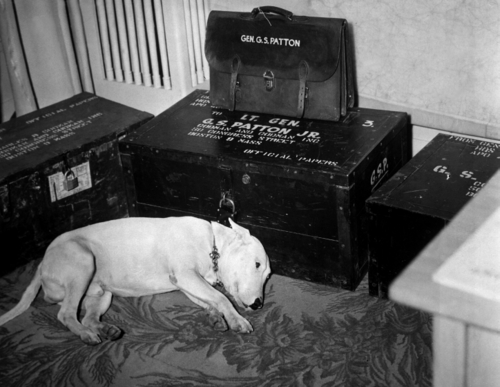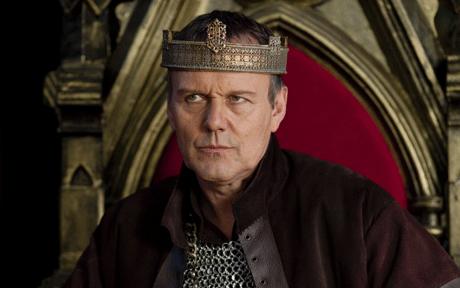If you can still remember that bulleted list from two pages back, you’ll recall there was no mention on it of Arthur’s father. That’s because before the Welsh poets inflated Arthur’s reputation so, he didn’t really need one. Prior to the twelfth century, Arthur was a minor character in the story of how the Saxons finally displaced the British as rulers of Britain, a clever and brave general, sure, but ultimately a doomed one. You don’t need to see Patton as a little boy or be introduced to his dad to tell his story. You start with him giving a speech in front of a flag and cut right to the battles. ((And for some reason end with him walking his dog.))
As Lord Raglan and Joseph Campbell would tell us, it’s only the heroes that need heroic fathers. ((Note to Patton fans, I’m not dissing your guy. That’s hero with an implied capital H, the thousand-faced kind. I’m pretty sure nobody ever said Patton was born of a virgin and journeyed to the underworld for an encounter with the sacred feminine. Maybe in the director’s cut of the George C. Scott film.)) But if you pore over all those surviving Welsh poems and stories, you still won’t find any mention of a father for Arthur there, either. Though the Sawley Glosses assure us that Arthur was known as mab Uter, there’s not a single Arthur mab Uther, to be found–or mab anybody else, for that matter. It’s not that Arthur was spat fully formed from his mother’s forehead; it’s just that his father doesn’t seem to have ever come up.
In part, the lack of attention to Arthur’s father probably stems from the Welsh poet’s uncle-nephew-cousin fixation. Or, to be all anthropological about it, when the Arthur stories were popular, Welsh society was still primarily organized horizontally. A man’s closest allies were thought to be his mother’s brothers and their sons. The heroic Arthur of Welsh myth had lots of relatives through his mother’s side of the family. ((Indeed, one scholar describes the Welsh Arthur’s maternal grandfather, Amlawdd Wledig, as just a name given to denote the source of the endless supply of daughters needed to give birth to all the cousins Arthur keeps running into.)) Just no father of note.
So why did Geoffrey suddenly care who Arthur’s father was? Some would have us believe that there was once a complete and consistent story of Arthur’s father and that Geoffrey merely copied it over into the Historia, probably botching important bits because he didn’t really know what he was doing. But that’s just necromancy again, the summoning of a Ghost of Uther to hang out with the Ghost of Arthur. And even if there were a story of Arthur mab Uther that Geoffrey had but we have lost, Geoffrey would have been under no obligation to transfer it into the Historia he was writing to please his aristocratic audience. The Normans weren’t expecting Arthur to have a father of any great interest, not if they knew Arthur from William of Malmesbury or the Welsh saints’ lives. Geoffrey could very well have assigned the part of Arthur’s father to some minor noble with the appropriate pedigree, or just used the name as a placeholder, just one link in a chain of somebody son of somebody son of somebodys that ended in Arthur.
Ultimately, I think the reason Geoffrey suddenly found he needed Uther was that he was up to something far more ambitious than merely copy-pasting some Welsh bits into the chronology from the Historia Brittonum, more ambitious even than trying to meld two disparate but complete strands of the Arthurian corpus into one narrative. But our belief in the Ghost of Arthur (and of Uther) tends to keep us from seeing anything Geoffrey did as deliberate or new.
Uther in particular has long escaped critical attention because of this bias. When scholars talk of Uther, the main focus has always been trying to track down Geoffrey’s source for him. Of course, we know Geoffrey got the name from the Welsh stories, as there does seem to be a guy named Uther Pendragon (or something close) floating around there. We may even have a poem written from this Welsh Uther’s perspective, the so-called Death-song of Uther Pendragon (Marwnat Vthyr Pen). The Welsh stories, however, completely lack any of the details that Geoffrey ascribes to his Uther. The Welsh Uther seems to have been a bard and a magician in the mold of Taliesin or Merlin, but it’s never said he took on the shape of another man to seduce his wife, nor that he had a brother that was king before him, nor that he traveled with Merlin to secure the Giant’s Dance from Ireland, nor that his becoming king was signified by a comet in the sky, nor that he was killed by poison and buried at Stonehenge (the Giant’s Dance he helped move), nor that–well, you get the point; there’s a lot of nors, just not a lot of Geoffrey’s story.
If the Welsh material fails us, we’ll also try pinning Geoffrey’s story on one of the many stories we know about heroes who had fathers who shapechanged into something or other in order to get with the hero’s mother. But none of the famous ones seem to fit very well, either. Uther is no god like Zeus; he has to have Merlin’s help to change forms. He’s not even a magician ((Geoffrey’s Uther isn’t, that is. The Welsh Uther probably was, but there’s no sign of his magic being used for getting busy type purposes.)) like Alexander’s legendary father Nectanebus. And there are half a dozen others I could go into, but we’re already at word 8 million for this week’s entry, so maybe I should drive this towards a close with one last thought.
If you look back at the bulleted list on the first page one more time, but cross out the name Arthur (and the other proper nouns while you’re at it), ((Warning: Got Medieval Enterprises assumes no liability for computer screens damaged by overly literal users.)) a lot of the nameless details could be assigned to Geoffrey’s Uther just as easily as to Arthur. It’s Uther in the Historia who’s a bully with trouble keeping his beloved where he wants her. It’s Uther who fights the Saxons, Uther who is Ambrosius Aurelianus’ chief general, and Uther whose last battle against the Saxons takes place on a hilltop (Damen instead of Badon). Though he’s not said to be coming back one day, Uther even gets the chance to play at being on the border between life and death, when he fights the Saxons while sick and carried in a horse-litter. That probably sounds like a bit of a stretch, and it would be if Geoffrey’s Uther didn’t go on to boast about being “the half-dead king”. It’s not got the panache of “once and future,” I’ll grant you, but it’s somewhere in the ballpark.
But for the moment, I feel like Carl the half-dead blogger, so I’ll let you rest your eyes until next week, when I really will get around to explaining what I think Geoffrey was up to with Uther. ((Really. Really really. No crosses count. No takesies backsies.))

